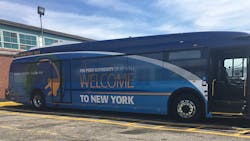Half of PANYNJ’s airport shuttle fleet operates under electric power
The Port Authority of New York and New Jersey (PANYNJ) has reached the half-way point in its plan to replace all 36 shuttle buses used at area airports with electric vehicles. The recent delivery of six all electric shuttle buses at LaGuardia Airport brings the total of electric buses in operation at the airports to 18.
PANYNJ says reaching the half-way mark of its transition to electric power at the agency’s three major regional airports meets a key objective of its “Clean Dozen” sustainability program and reaffirms its October 2018 embrace of the Paris Climate Agreement.
The addition of the LaGuardia fleet follows a similar rollout at John F. Kennedy and Newark Liberty International airports. The 18 buses make up 50 percent of the full daily shuttle fleet being converted from diesel to electric power, with PANYNJ now targeting mid-2020 for a 100-percent electric shuttle bus fleet. New charging stations to power this first phase of electric bus deployment are being installed at each airport.
"The Port Authority continues to make sustainability a top priority, and we will continue to set and meet aggressive goals that promote smart investments and reduce the environmental impact on local communities across the region,” said Board Chairman Kevin O'Toole.
"The conversion to all-electric airport shuttle buses is running ahead of schedule – a testament to our commitment to reducing GHG emissions across all of our facilities," said Port Authority Executive Director Rick Cotton. "The Port Authority continues to push for results that will make the spirit of the Paris agreement a reality for the agency and our customers."
“The addition of new electric shuttle buses at LaGuardia advances our GHG reduction goals and improves local air quality for our neighbors and airport workers,” said Christine Weydig, director of the agency’s Office of Environmental and Energy Programs. “We are proud that the Port Authority’s fleet electrification commitments are catalyzing the market for cleaner vehicles, which will have an impact well beyond the region.”
The first phase of the program will save approximately 269 tons of greenhouse gas emissions and 40,000 gallons of diesel fuel per airport each year, and improve local air quality by removing about 2,000 pounds of nitrous oxide and 150 pounds of particulate matter from the air annually. The battery-operated, 40-foot buses have an estimated range of about 250 miles per charge, with each charge taking less than four hours.
The electric bus program is a key component of the Port Authority's Clean Dozen environmental and sustainability agenda, designed to meet the goal of reducing its greenhouse gas emissions by 35 percent by 2025, and advancing its long-term goal of an 80-percent reduction of all emissions by 2050. The initiatives were rolled out in October when the Port Authority Board of Commissioners committed to the Paris Climate Agreement, becoming the first public transportation agency in the United States to do so.
The initiatives cover seven specific areas of sustainability and environmental action across the agency: clean electric vehicles; energy efficiency; solar and renewable energy programs; building "green" facilities; clean ship practices for ocean-going vessels; offshore wind; and partnering to combat climate change.
